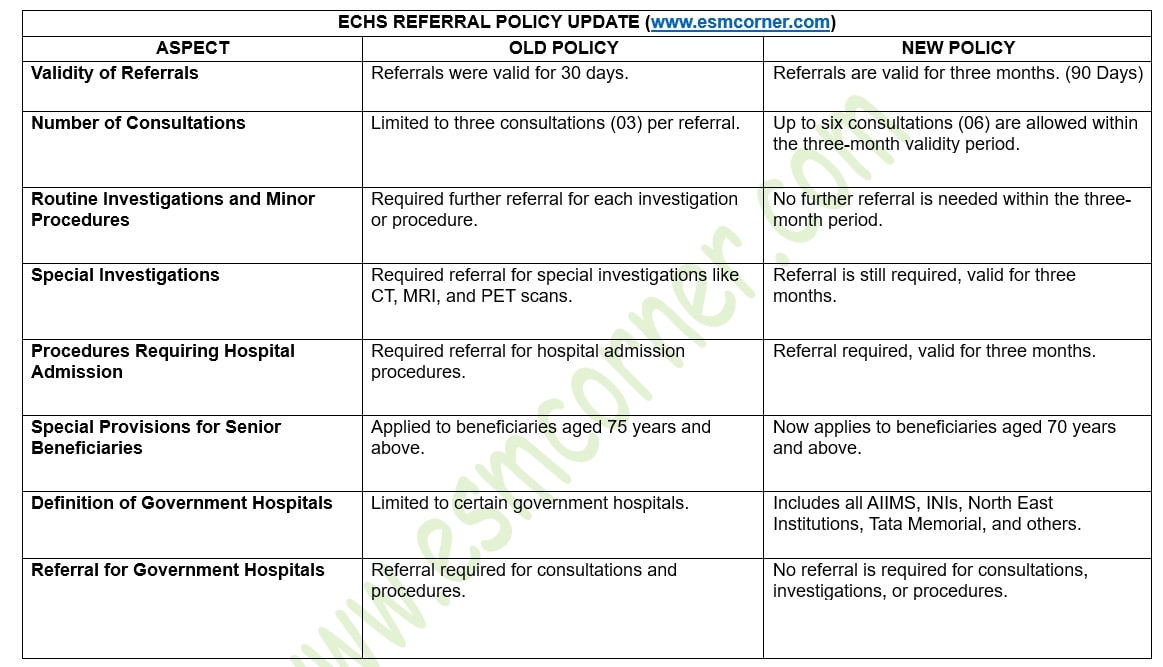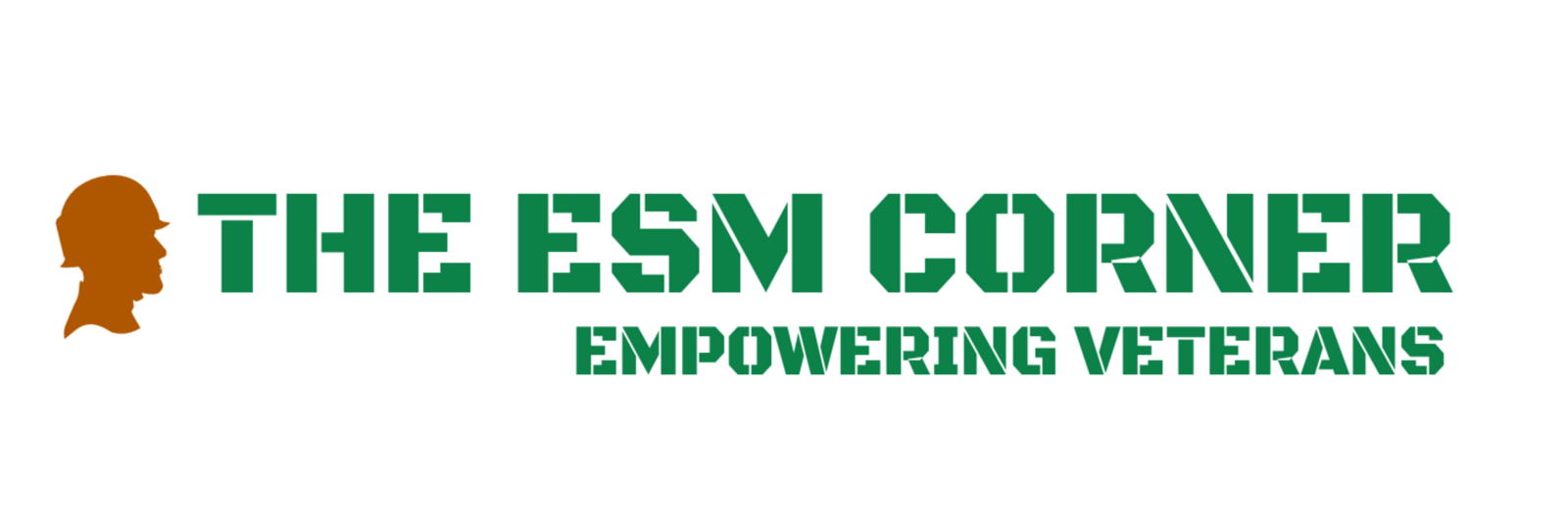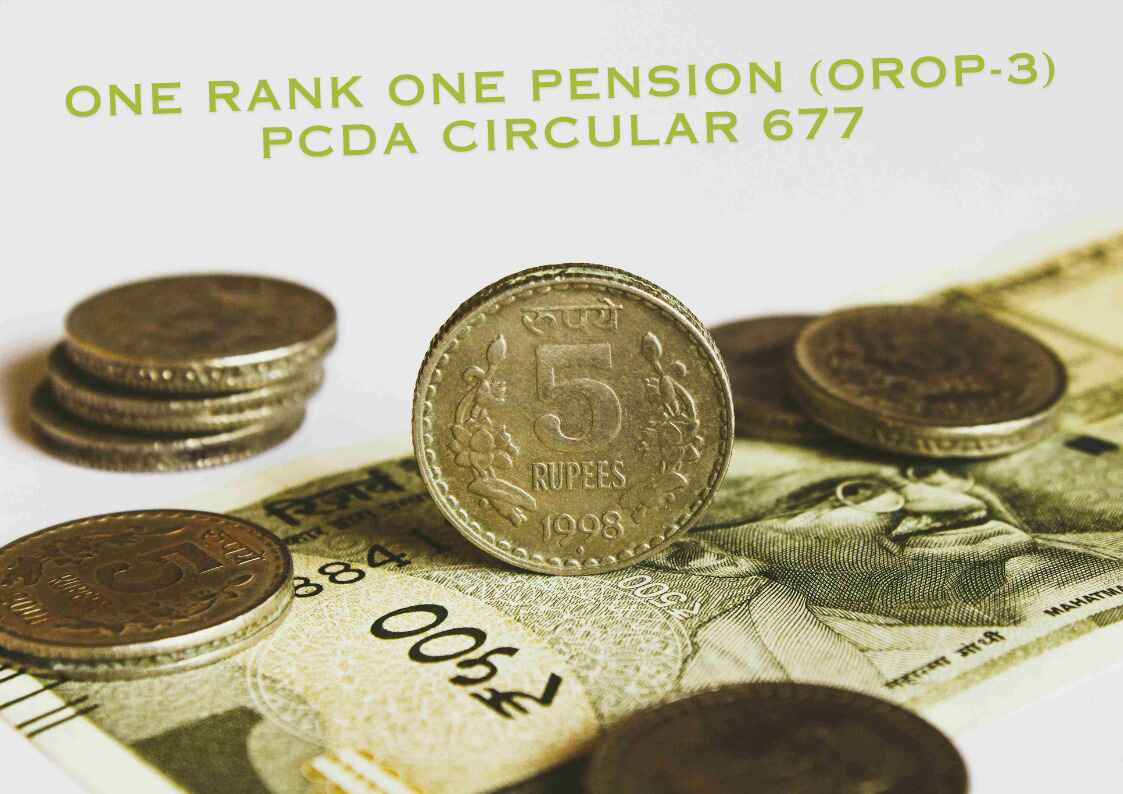
ECHS referral system has recently undergone significant changes. These updates are designed to simplify the process for beneficiaries seeking consultations, investigations, and treatments at both government and private empanelled hospitals. This article explores the latest policy updates and compares them with previous guidelines to offer a clear understanding of the new modifications.
Treatment at Private Empanelled Hospitals
The recent modifications in the ECHS referral system are designed to enhance the efficiency and accessibility of healthcare services. Here are the key changes:
Single ECHS Referral for Specialist Consultation:
- Old Policy: Previously, ECHS referrals were valid for a shorter period of 30 days only, often requiring beneficiaries to obtain multiple referrals for ongoing treatments. The new policy extends the validity to three months, reducing the administrative burden on beneficiaries.
- New Policy: An ECHS referral issued by any Medical Officer of an ECHS Polyclinic will now be valid for three months. During this period, the beneficiary can consult up to two more specialists, making a total of three specialists if recommended by the primary specialist. A maximum of six consultations are allowed within this three-month validity period.

Number of Consultations:
- Old Policy: Previously, the number of consultations allowed under a single referral was limited to three only.
- New Policy: The new guidelines permit up to six consultations within the three-month validity period, providing greater flexibility and access to specialist care.
Investigation and Treatment Procedures:
- Old Policy: The requirement for referrals for special investigations like CT scans and MRIs remains, but the process has been streamlined to ensure timely access to necessary diagnostic procedures.
- New Policy: No further referral from the ECHS Polyclinic is required for undergoing routine listed investigations and minor procedures that do not require hospital admission, as advised by the specialist. This is valid within the three-month period from the date of the initial referral. However, for special investigations like CT-Scan, MRI Scan, PET Scan, and any other investigation costing over Rs. 3,000, a referral from the ECHS Polyclinic is required, valid for three months.
Procedure For Hospital Admission:
- New Policy: A ECHS referral from the Medical Officer of the ECHS Polyclinic is required for any procedure necessitating hospital admission. This referral is also valid for three months.
Special Provisions for Senior Beneficiaries:
- New Policy: In a partial modification, the special provision for ECHS beneficiaries to avail consultations, investigations, and treatment procedures now applies to beneficiaries aged 70 years and above, instead of the earlier age limit of 75 years.
- Old Policy: The reduction in the age limit for special provisions from 75 to 70 years reflects a more inclusive approach, recognizing the healthcare needs of older beneficiaries.
Treatment at Government Hospitals
- New Policy: The term “Government hospital” now includes all AIIMS institutions, Institutions of National Importance (INIs), North East Institutions, Tata Memorial Hospital, and all other medical institutions under the Central and State governments.
- New Policy: No referral or permission is required for undergoing consultation, investigation, or treatment procedures, including unlisted investigations and procedures, at government hospitals.
Conclusion
The revised guidelines for ECHS referral procedures mark a significant step towards improving healthcare access for beneficiaries. By extending the validity of referrals, increasing the number of allowed consultations, and simplifying the process for special investigations, the new policy aims to provide a more efficient and beneficiary-friendly healthcare system. These changes are expected to reduce the administrative burden on beneficiaries and ensure timely access to quality healthcare services.
The approval of these modifications by the Managing Director of ECHS underscores the commitment to continuously improving the healthcare services provided to Ex-Servicemen and their dependents. As these changes are implemented, beneficiaries can look forward to a more streamlined and accessible healthcare experience.
TRANSFORMING ECHS FACILITIES : 5 MAJOR CHANGES FOR BETTER FACILITIES
ALSO READ : WHAT IS THE PROPOSED “YUDH SAMMAN YOJANA”?
Do You want to stay updated on post retirement affairs and welfare news click here to join our Whatsapp group






[…] here to Read I REVISED GUIDELINES FOR ECHS REFERRAL […]
[…] REVISED GUIDELINES FOR ECHS REFERRAL PROCEDURES: AN OVERVIEW […]
[…] ALSO READ l REVISED GUIDELINES FOR ECHS REFERRAL PROCEDURES: AN OVERVIEW […]
O K
Nothing about referral for Ayurveda Hospital from those echs polyclinic where no any ayurveda doctor
As no referral required for AIIMS an ESM has to stand in general queue which is often very much time taking and not feasible for a veteran patient to stand, whereas there is very small queue for CGHS retirees.
Matter should be taken up with higher authorities to add(same queue)with CGHS retirees.
As no referral required for AIIMS an ESM has to stand in general queue which is often very much time taking and not feasible for a veteran patient to stand, whereas there is very small queue for CGHS retirees.
Matter should be taken up with higher authorities to add(same queue)with CGHS retirees.